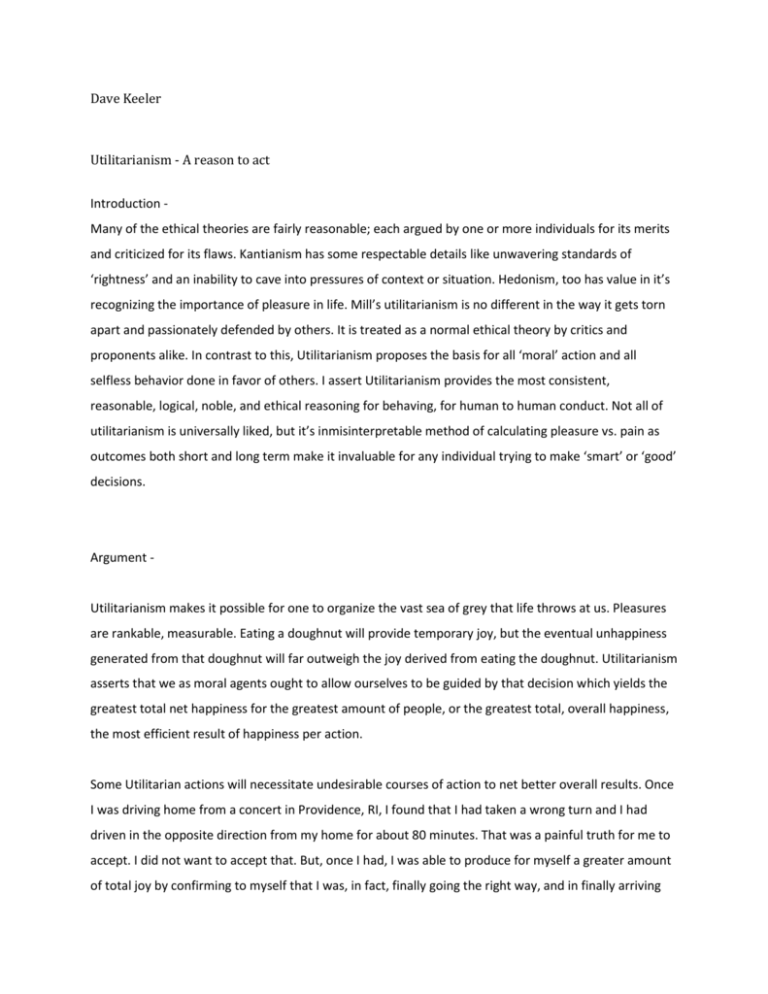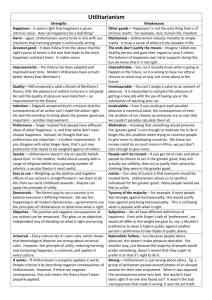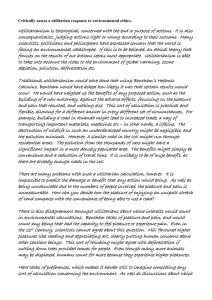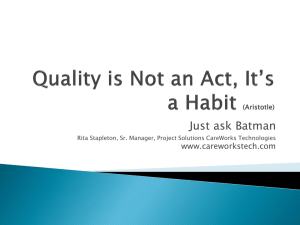Utilitarianism Essay
advertisement

Dave Keeler Utilitarianism - A reason to act Introduction Many of the ethical theories are fairly reasonable; each argued by one or more individuals for its merits and criticized for its flaws. Kantianism has some respectable details like unwavering standards of ‘rightness’ and an inability to cave into pressures of context or situation. Hedonism, too has value in it’s recognizing the importance of pleasure in life. Mill’s utilitarianism is no different in the way it gets torn apart and passionately defended by others. It is treated as a normal ethical theory by critics and proponents alike. In contrast to this, Utilitarianism proposes the basis for all ‘moral’ action and all selfless behavior done in favor of others. I assert Utilitarianism provides the most consistent, reasonable, logical, noble, and ethical reasoning for behaving, for human to human conduct. Not all of utilitarianism is universally liked, but it’s inmisinterpretable method of calculating pleasure vs. pain as outcomes both short and long term make it invaluable for any individual trying to make ‘smart’ or ‘good’ decisions. Argument - Utilitarianism makes it possible for one to organize the vast sea of grey that life throws at us. Pleasures are rankable, measurable. Eating a doughnut will provide temporary joy, but the eventual unhappiness generated from that doughnut will far outweigh the joy derived from eating the doughnut. Utilitarianism asserts that we as moral agents ought to allow ourselves to be guided by that decision which yields the greatest total net happiness for the greatest amount of people, or the greatest total, overall happiness, the most efficient result of happiness per action. Some Utilitarian actions will necessitate undesirable courses of action to net better overall results. Once I was driving home from a concert in Providence, RI, I found that I had taken a wrong turn and I had driven in the opposite direction from my home for about 80 minutes. That was a painful truth for me to accept. I did not want to accept that. But, once I had, I was able to produce for myself a greater amount of total joy by confirming to myself that I was, in fact, finally going the right way, and in finally arriving home, albeit a little embarrassed and fearful of leaving Aquidneck Island again. By enduring an undesirable experience, an experience that caused me to experience pain (admitting that I had been lost for over an hour and had created a great deal more work for myself), I was able to access a greater joy that I would not have otherwise been able to reasonably attain. Utilitarianism does sometimes ask the moral agent to give up something that produces a substantial amount of pleasure to produce something that produces an un-ignorable amount of pleasure, significantly more than the quantity of pain suffered in giving up whatever pleasure was given up. This can make some people uncomfortable, especially as the stakes raise, but life shows us that the ability to make judgments on intellectual and moral value concerning our future and our society that we can improve the lives of others and avoid catastrophe. Utilitarianism is extremely valuable in helping one choose the lesser of two evils, often a disgusting scenario to be caught in. The necessity of this originates in the heartless way life asks us to select our favorite of two loves, and tells us the lesser-loved must be discarded to an extent. In Christopher Nolan’s Batman: The Dark Knight, Bruce Wayne is forced to choose between saving the love of his life Rachel or the D.A. that protects Gotham’s’ hope for humanity, Bruce chooses to attempt to save Rachel. I assert this was a utilitarian decision. Wayne knew that had he planned to save the District Attorney, he would have done a lot of good doing so, protecting the hope, innocence, and safety of Gotham’s people, certainly a very noble purpose. However, Batman also understands that he himself is an essential cog in protecting Gotham from corruption, attack, and that if he loses Rachel, he will be crippled in his will to live and fight for what he believes in. Batman knows that Gotham needs Batman to survive in a manner that justifies survival, and that Batman needs Rachel to survive in a manner that justifies survival, therefore, keeping Rachel alive keeps Gotham alive. As many know, Batman inadvertently saves the DA instead of Rachel because the Joker deceived him, but that is irrelevant. Wayne was likely motivated by what could keep him alive and kicking so Gotham could stay alive and kicking. Rebuttal - Quantifying pleasures or pains is an absurd science. How can one determine what is more pleasurable, a Boston crème doughnut, or a longer life of health? Maybe it’s an intensely delicious doughnut. Who are we to say which pleasure is higher and which is lower. Just because one pleasure requires more work doesn’t necessarily mean it’s better. I could walk to the library and search in an old encyclopedia for the average lifespan of the lobster, or I could type it into Google and get the same, if not more accurate data answering my question. Utilitarianism is flawed because it tries to measure something that is immeasurable. Response - There is no ruler for measuring the voltage of joy experienced when eating a doughnut or when being still alive at 92 and running a 5k. That cannot be comparably measured in the way a machine might try and compare those two. But looking back to history can help one determine what brings happiness. Stable societies thrive on relative small gaps between classes, and a people active in searching, learning, and working. People in history commonly remembered as happy tend to have worked for their happiness, not simply having been given it. That happiness is unsatisfying and leaves the human spirit thirsty. Prioritizing the type of pleasure that places effort over instant gratification reliably produces more pleasure than pain. Conclusion - Utilitarianism is totally radical, even Batman practices it, and Batman is totally radical. It provides a logical system for decision making where no one individual ends up with all the power. No one is selfcentered. No one is going out hurting others. Utilitarians all look out for each other, and for others who aren’t utilitarians.





